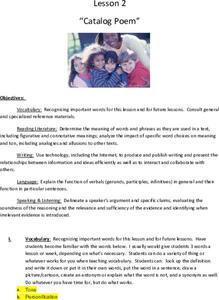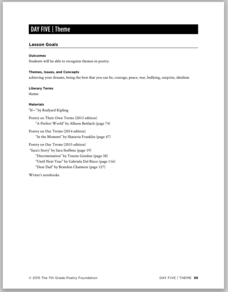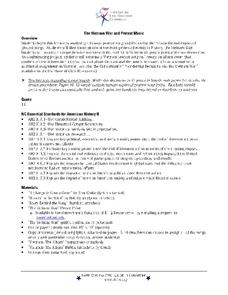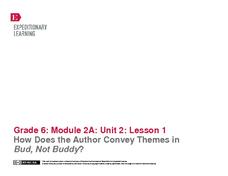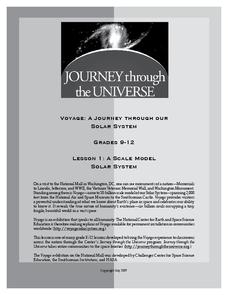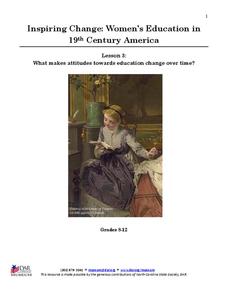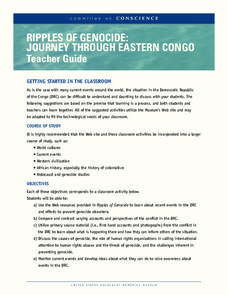K20 LEARN
Rikki-Tikki-Types of Sentences: Indicative, Imperative, Interrogative Mood
Rudyard Kipling's "Rikki-Tikki-Tavi" and a song from the musical "Hamilton" allow middle schoolers to practice using punctuation to indicate whether sentences are indicative, imperative, or interrogative.
Curated OER
Abigail’s Daily Life
Young scholars continue their analysis of Abigail Adam's letters looking in this lesson plan at what they reveal about her daily life and concerns about the increasing political tensions with the British.
Curated OER
Abigail and John in Love
The second lesson in the series asks groups to analyze an exchange of love letters between Abigail and John Adams. Scholars identify the many allusions and references in the letters and consider what they can infer about the writers.
Utah Education Network (UEN)
8th Grade Poetry: Catalog Poem
After conducting a close reading of Billy Collin's poem "Forgetfulness" and responding to questions on a worksheet, young poets craft catalog poems and share their work with a partner. The lesson ends with the partner using the provided...
Curated OER
Theme
A study of Rudyard Kipling's poem, "If," launches a lesson plan about theme. Class members read Kipling's poem and poems by other seventh graders to identify the themes.
Carolina K-12
The Vietnam War and Protest Music
Here's a must-have resource for your Vietnam War curriculum file. Class members view a PowerPoint that details the background of the conflict and then examines the reasons for and the effects of protest songs on American attitudes toward...
K20 LEARN
Argument Is Everywhere: Introduction to Argument
C.E.R = Claim + Evidence + Reasoning. That's the framework behind building a solid piece of argument writing. Introduce young writers to this format with an engaging lesson that uses YouTube videos and a PowerPoint to illustrate the...
Institute of Electrical and Electronics Engineers
Adaptive Device Design
After reading about how engineering has made adaptive devices possible for people with disabilities, pupils work in groups to discuss different devices to determine whether or not they are adaptive. They also disassemble a pair of...
Council for Economic Education
Specialization and the Decathlon
Michael Phelps, the economist? Scholars research the economic advantages of specializing in one kind of service, and how it relates to athletes doing the same in their respective sports. They evaluate absolute advantage, production, and...
Baylor College
The Variety and Roles of Microbes
Mini microbiologists play a card game in which they group microorganisms by groups: virus, fungus, protist, or bacteria. Then they identify the roles different microbes play in the natural world and explore how humans effectively use...
Crafting Freedom
The Self-Empowerment of Harriet Jacobs
In a hands-on learning activity, pupils read about and recreate the experience of Harriet Jacobs, author of one of the most famous slave narratives of all time in which she describes her years of hiding from her master in a confined...
Curated OER
The Rumpelstiltskin Story
Why didn't Rapunzel's hair stop growing? Why did it take the fairy godmother so long to intervene in Cinderella's affairs? Young writers consider unanswered questions like these and compose news articles investigating the true story...
EngageNY
How Does the Author Convey Themes in Bud, Not Buddy?
After reading up to chapter 12 of Bud, Not Buddy by Christopher Paul Curtis, scholars read chapter 13 and take part in a grand conversation about the author's writing techniques. Pupils discuss how his writing conveyed literary themes...
EngageNY
Grade 9 ELA Module 1, Unit 2, Lesson 3
How do writers develop a central idea in a text? How can readers identify this central idea? These are the challenges class members tackle as they continue their analysis of "Letter One" from Rainer Maria Rilke's Letters to a Young Poet.
Journey Through the Universe
A Scale Model Solar System
Between the time scientists discovered Pluto and reclassified it as a dwarf planet, it did not even make one full revolution around the sun. In two activities, scholars investigate scale models and their properties. Pupils find that it...
LABScI
Acoustics: The Sound Lab
If the delay between a sound and its echo is less than 1/10th of a second, the human ear can’t distinguish it. Through the use of a Slinky, rubber band guitar, and straws, scholars explore where sound comes from and how it travels. Whole...
American Evolution
Virginia Runaway Slave Ads
What does an ad reveal about a culture, or about the values of its intended audience? Class members examine a series of runaway slave ads—one of which was written by Thomas Jefferson—and consider what these primary source documents...
National Society Daughters of the American Revolution
Lesson 3: What Makes Attitudes Towards Education Change over Time?
The struggle for women's rights is not unique to this generation, or even to the 20th century. Class members explore the conflicting opinions of Alexander Graham Bell and his wife, Mabel Hubbard Bell, regarding women's pursuits of higher...
Kenan Fellows
Making Connections with Water Quality
What's in your water? And, why is water quality so important? Enhance your class's level of water appreciation through a lesson that demonstrates the necessity of water quality. Environmental enthusiasts explore the EPA's Clean Water...
US Holocaust Museum
Ripples of Genocide: Journey through Eastern Congo
Could you locate the Democratic Republic of Congo on a map? Scholars investigate the genocide taking place in Eastern Congo. Groups explore web-based evidence as well as the Ripples in Genocide source to take a closer look at the issue....
Annenberg Foundation
Taming the American West
Have you ever seen a movie about the romance of the American West with its buffalo, horses, cowboys, and endless frontier? The 13th installment of a 22-part series on American history presents the myths associated with the American West....
Carolina K-12
Affrilachia
What makes a culture unique? Learners research life in the Appalachia region of the United States. Poetry, music, and oral history create Affrilachia, the term used to describe the lifestyle of the area. African-American mountain culture...
Little Kids Rock
The Influence of Latin Music in Postwar New York City
Music has often been called the international language that transcends cultures and regions. Scholars analyze the impact of Latin American music on New York City culture in the years following World War II. They research music, video,...
Education Fund
Fear the Scarce Resources
In a life or death situation, what resources would you choose to survive—and why? A zombie attack simulation teaches learners the concepts of scarcity and resources in regards to economics. The hands-on activity requires individuals to...
Other popular searches
- Mood and Tone
- Mood and Tone Worksheet
- Tone Mood
- Teaching Mood and Tone
- Author's Tone and Mood
- Analyzing Tone and Mood
- Author's Tone
- Tone and Mood Powerpoint
- Frost Poetry Tone
- Literary Elements Tone
- Voice, Tone, Audience
- Tone of Voice





